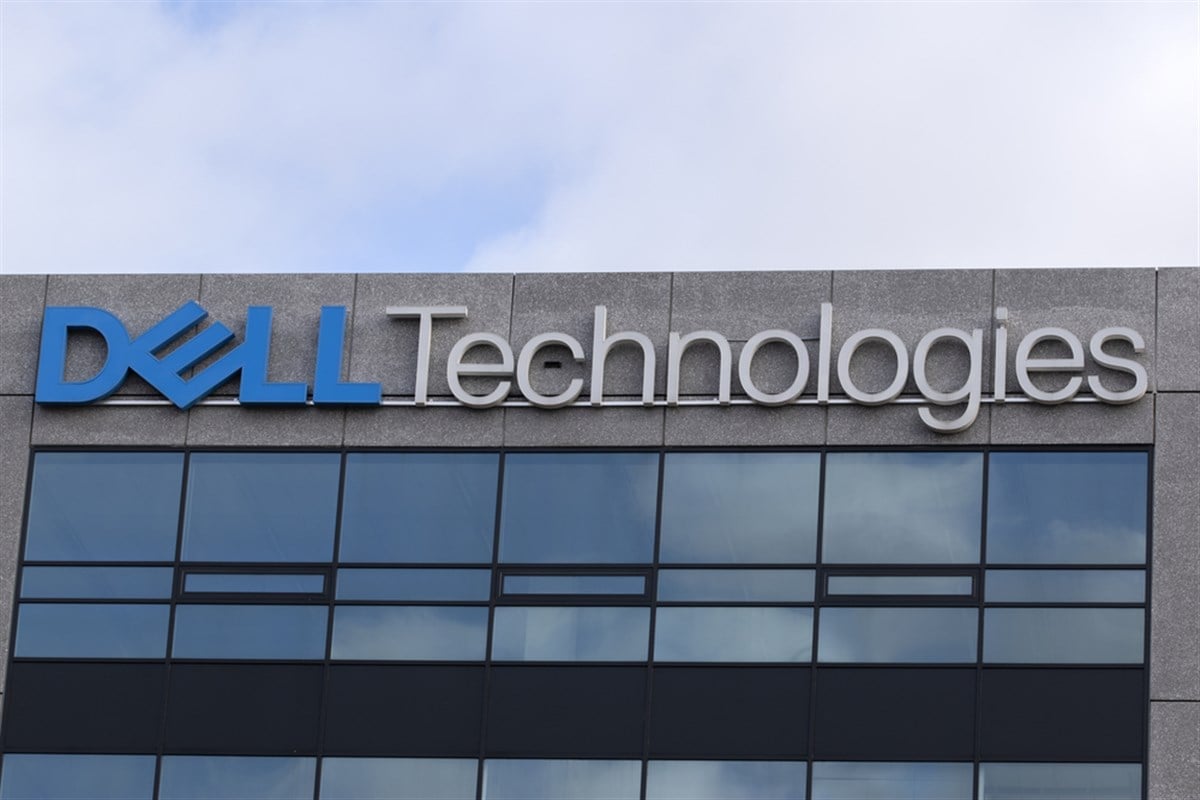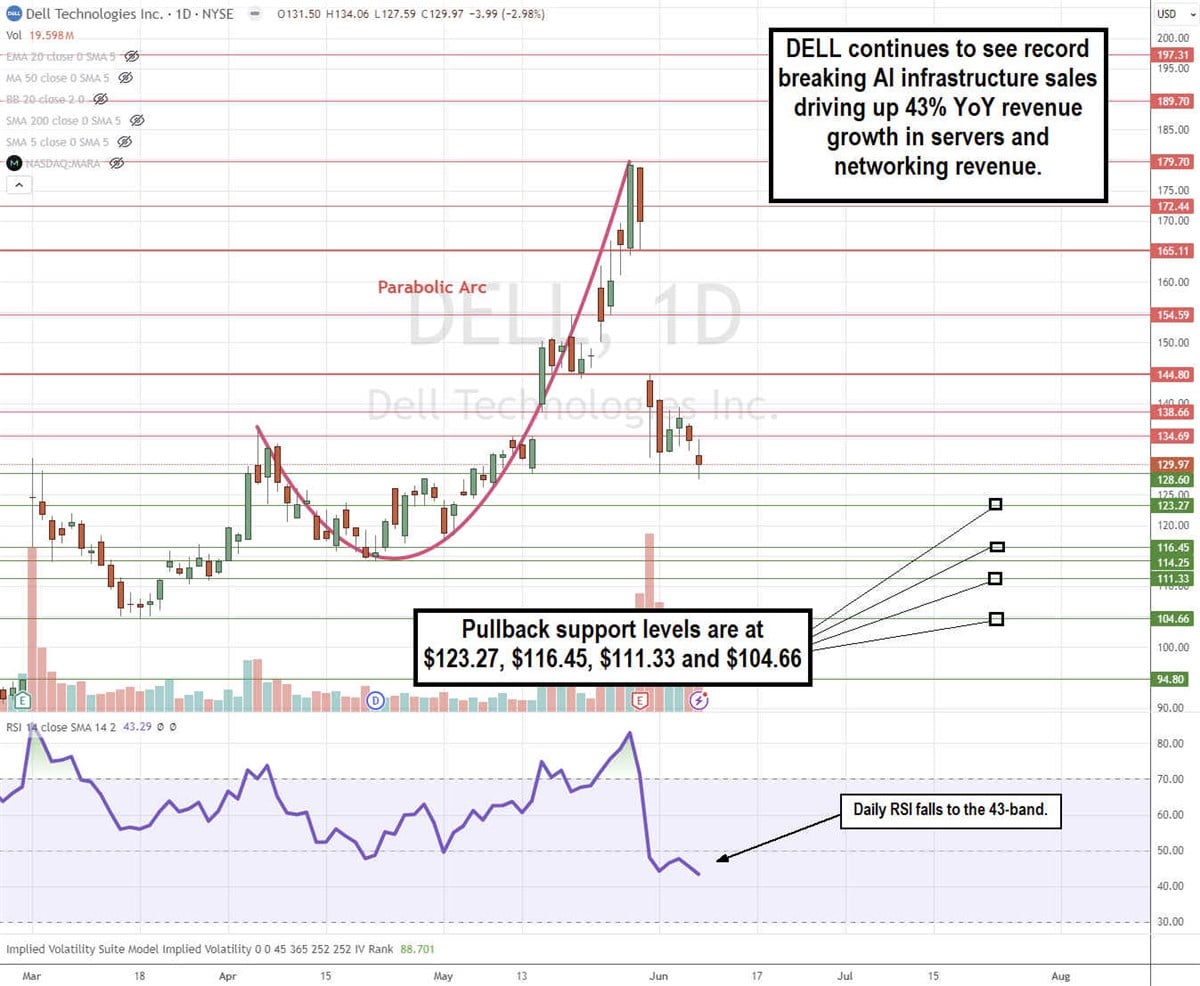
Dell Technologies Inc. (NYSE: DELL) is a leading hardware, software, and services provider in the computer and technology sector. From personal computers, laptops, peripherals, monitors, and tablets to enterprise data center servers, networking equipment, and virtualization software, Dell is a one-stop shop for enterprises and consumers. The company has been a benefactor of the artificial intelligence (AI) trend as its high-performance computing (HPC) server business can’t keep them in stock to appease the insatiable demand for AI servers with over $3.8 million in backlog orders. Shares took a hard tumble on its fiscal Q1 2025 earnings results despite record growth in its infrastructure products.
Dell Technologies competes with hardware and software providers, including Hewlett Packard Enterprise Co. (NYSE: HPE), International Business Machines Co. (NYSE: IBM), and Super Micro Computer Inc. (NASDAQ: SMCI).
Dell Technologies is an IT Powerhouse
Michael Dell started his company from his dorm room at the University of Texas in 1984 with $1,000. He provided customer upgrades for personal computers (PCs) and gradually started selling custom-made PCs. The company grew rapidly until it became the country's largest seller of PCs by 1999. The company ventured into the consumer electronics market by adding peripherals like televisions, monitors, and digital cameras to its product lineup.
The company acquired storage solutions provider EMC in 2016, which also owned virtualization software company VMware. VMware was eventually sold to Broadcom Inc. (NASDAQ: AVGO) in late 2023. The company has since grown into an IT powerhouse, combining the world's broadest GenAI infrastructure and multi-cloud portfolios to drive the AI revolution.

DELL Forms a Bearish Parabolic Arc Pattern
The daily candlestick chart on DELL illustrates a bearish parabolic arc pattern. This pattern indicates a reversal to an uptrend. It's called a parabolic arc because prices surge in a parabolic fashion as it did on DELL from $114.25 on April 22, 2024, to a high of $179.70 on May 29, 2024. Shares sold off heading into its fiscal Q1 2025 earnings report. Shares gapped down 18% following the report and have sold off to the $128.60 support level. The daily relative strength index (RSI) peaked at the 83-band and has since fallen to the 43-band. Pullback support levels are at $123.27, $116.45, $111.33, and $104.66.
Dell Technologies Reports Q1 2025 Earnings: Highlights and Insights
Dell Technologies reported fiscal Q1 2025 EPS of $1.27, matching consensus analyst estimates, not crushing them like its preview six quarters. Revenues rose 6.3% year-over-year (YoY) to $22.24 billion, beating $21.69 billion consensus analyst estimates. This indicates revenues are back to growth mode, finally breaking the cycle of falling YoY declines seen in the previous 6 quarters.
The Clients Services Group (CSG) is Dell's retail segment, which sells PCs, laptops, tablets, and peripherals to consumers and businesses. Revenues were flat YoY at $12 billion. Commercial client revenues grew 3% YoY to $10.2 billion. Consumer revenue was down 15% to $1.8 billion.
Dell’s ISG Shines with Robust YoY Revenue Growth
The brightest spot on the earnings report was the robust 22% YoY revenue growth of its Infrastructure Solutions Group (ISG) of $9.2 billion. This segment sells servers, storage, networking products, and virtualization software to enterprise data centers. Its servers and networking revenues rose 42% YoY to a record $5.5 billion, driven by the sizzling demand for AI servers, which had $2.6 billion in orders. AI-optimized shipments rose 100% sequentially to $1.7 billion, totaling over $3 billion in AI servers shipped in the past 3 quarters. AI server backlog is $3.8 billion, up $900 million sequentially.
Dell Disappoints with Mixed Forward Guidance
Dell Technologies issued mixed guidance. For fiscal Q2 2025, the company sees EPS of $1.55 to $1.75, falling shy of $1.88 consensus analyst estimates. Revenues are expected between $23.50 billion to $24.50 billion versus $23.35 billion consensus estimates. This indicates that margins may be getting squeezed, especially with a more competitive pricing environment.
Fiscal full-year 2025 EPS was raised to $7.40 to $7.90, up from $7.25 to $7.75, versus $7.74 consensus estimates. Full-year 2025 revenue guidance was raised to $93.50 to $97.50 billion, up from $91 billion to $95 billion versus $94.64 billion consensus analyst estimates.
Dell Technologies: PC Refresh Cycle Approaching as Windows 10 Ends
Dell Technologies COO Jeff Clarke believes commercial PC demand has stabilized and will continue to improve. The PC refresh cycle is also approaching as Windows 10 reaches the end of its life next year. The installed PC base is growing, and most importantly, the industry is advancing significantly in AI-enabled architecture and applications.
Dell’s AI Strategy is Based on 5 Core Beliefs
At its annual Dell Technologies World customer event, Clarke noted that for Dell, AI is front and center. He made the key point that data is the differentiator and reiterated their AI strategy to accelerate AI adoption through five core beliefs.
Clarke asserted, “The first (core belief is) data is the differentiator. 83% of all data is on-prem, and 50% of data is generated at the edge; second, AI is moving to the data because it's more efficient, effective, and secure. And AI inferencing on-prem can be 75% more cost-effective than the cloud; third, AI will be implemented in a wider range of ways, from locally on devices to massive data centers depending on the use case; fourth, you need an open, modular architecture to support rapid and sustainable innovation; and finally, AI requires a broad and open ecosystem to take advantage of the latest advancements.”
Dell Technologies analyst ratings and price targets are on MarketBeat.
